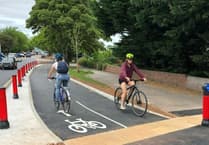I RECENTLY had the pleasure of visiting Exeter Racecourse, one of the South West’s most iconic sporting venues.
Perched high on the Haldon Hills near Kennford, the course offers sweeping views across the Devon countryside, making it not only a treat for racing fans but also a magnet for visitors from far and wide.
It is a location steeped in heritage, home to generations of racing enthusiasts, and a jewel in our county’s leisure crown.
Racing in Devon is far more than a pastime. It is a critical part of our regional economy, providing enjoyment for millions while delivering jobs, investment, and tourism benefits which ripple out well beyond the track itself.
For Central Devon, the racecourse is a driver of prosperity in the same way that our successful, independent pubs, cafés, and shops - such as The Phoenix in Chudleigh or Coco’s in Crediton - form the glue that binds communities together.
They provide gathering places that combat rural isolation and bring life and vibrancy to our towns and villages.
Yet my visit came at a worrying time for those whose livelihoods depend on racing.
With Rachel Reeves’ forthcoming Budget casting a long shadow, there is real anxiety about the prospect of an increased gambling tax this November.
The people I met spoke with one voice: if new tax hikes hit the industry, it will hurt.
The racing sector has already weathered storms of rising costs, from energy and supplies to increased staff wages.
The Government’s rise in employer National Insurance contributions - effectively a “Jobs Tax” - has piled on yet more pressure, making it harder for local firms to expand, take on new staff, and invest in future growth.
Adding a further burden through higher gambling duties would be economically short-sighted and deeply damaging.
While much public debate centres on taxing large online betting firms, those in racing fear the fallout will inevitably reach racecourses.
For a venue like Exeter, that could mean reduced prize money, fewer meetings, and a knock-on impact for hospitality suppliers, accommodation providers, and local businesses that depend on race day trade.
The threat mirrors concerns I have heard in other rural industries, such as farming, where proposed “Family Farm Taxes” have posed similar risks to viability.
Exeter Racecourse is more than a sporting venue - it is a community hub and an economic engine.
A punitive tax raid would jeopardise local jobs, weaken investment, and erode a cultural institution that has stood for decades.
That is why I will continue to champion racing at Exeter and beyond, ensuring that their concerns are heard in Westminster.
We need a government that backs our entrepreneurs, values our heritage industries, and secures the future of this vital Central Devon sector.
Facebook @melstridemp | Instagram @meljstride | X (Twitter) @MelJStride
Mel Stride
MP for Central Devon





Comments
This article has no comments yet. Be the first to leave a comment.